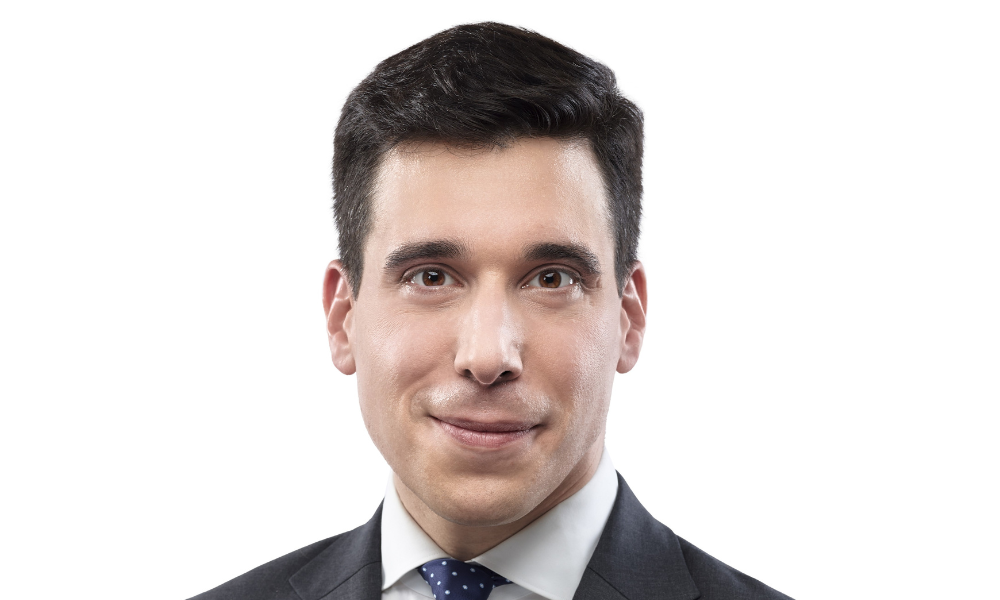
Top 25 lawyer and podcast host defends 2SLGBTQI+ youth rights through court action

Adam Goldenberg is a partner at McCarthy Tétrault and a leading civil liberties litigator. He is also the host of the firm’s Appealing Briefs podcast. Last year, Adam was recognized as one of the Top 25 Most Influential Lawyers by Canadian Lawyer magazine.
Goldenberg spoke to the CL Talk podcast about the legal battles he's leading in defence of 2SLGBTQI+ rights, the origins of his podcast, and how he balances high-stakes constitutional litigation with a demanding commercial practice.
Below is a summary of the conversation:
Whether he’s challenging legislation or unpacking the intricacies of appellate decisions on his podcast, Adam Goldenberg’s career is a study of how legal advocacy can shape the rules of society while balancing a commercial litigation practice at a top-tier firm.
“I have a podcast in part because I love the sound of my own voice,” Goldenberg jokes. That irreverence belies the depth of strategy behind Appealing Briefs, a podcast born during the pandemic when Goldenberg and his colleagues saw an opportunity to engage clients in a more accessible format than legal documents. “Being able to consume that orally by listening to a podcast, was desirable, and other firms in the United States, in particular, we're moving in this direction,” he says.
Now, the podcast breaks down appellate court decisions for a business audience, and Goldenberg ensures episodes don’t overstay their welcome. “We wanted to keep the episodes short, bite-sized, no more than 12 minutes,” he says. “You should be able to learn a case or two on your commute to work in the morning.” In a profession notorious for verbosity, that kind of brevity is a discipline Goldenberg links to his frequent appearances at the Supreme Court of Canada. “If you're on for an intervener, for example, you get five minutes, and when those five minutes are over, they are over. The chief justice is going to shut you down,” he says.
But his influence isn’t confined to studio microphones or Supreme Court chambers. Goldenberg is the lead counsel challenging recent provincial legislation that restricts the rights of gender-diverse students in schools. He represents 2SLGBTQI+ community groups that are challenging laws in Saskatchewan and New Brunswick that restrict the use of gender-diverse students' chosen names and pronouns.
The Saskatchewan case put his team in the national spotlight. They successfully obtained an injunction to halt the law’s implementation – a win that was swiftly countered when the province invoked the notwithstanding clause to override the Charter rights in question. Goldenberg’s team responded by pushing forward with the constitutional challenge regardless.
“In the Saskatchewan case, we did that by putting in evidence from experts,” he says, referencing how they met the legal standard of proving irreparable harm. “The Court of King’s Bench in Saskatchewan accepted [it] as establishing irreparable harm to gender diverse young people.”
That challenge now sits with the Saskatchewan Court of Appeal. Meanwhile, Goldenberg is already litigating another battle against Alberta’s legislation banning gender-affirming healthcare for youth – even with parental and physician consent. “It's a disgusting policy,” he says. “It's going to cause irreparable harm to a lot of gender-diverse young people.”
Goldenberg doesn’t pull punches. His public law practice – what he describes as his “evenings and weekends” job – is deeply personal. “How did I come to start doing the [2SLGBTQI+] rights work? I guess I was born this way,” he says. “I grew up at a time when my rights as a queer person were being litigated in the courts.” His advocacy is rooted in gratitude to the lawyers who litigated before him and fought for the rights that shaped his own ability to live openly. “Those lawyers who did that work were my heroes when I went to law school.”
But doing this work – on top of his commercial caseload – comes at a cost. “You can ask my husband whether I actually do [have a life] or not,” he jokes. “All of that sometimes has to be compromised in order to make the time to do these kinds of cases.” Yet Goldenberg sees this as core to his professional identity. “If I weren’t doing this… I wouldn't feel whole as a professional.”
Despite his visibility and success, Goldenberg is measured about progress in the legal profession. “If we're talking about people like me who are white, cisgender, from a privileged background… the road for me has been very easy,” he says. “But I don't know that it would have been as easy if I weren't cisgender, if I weren't white, if I weren't male.” He’s candid about how much more needs to be done to create genuine equity in law, especially for those outside that privileged demographic.
Still, he credits his firm, McCarthy Tétrault, with backing him fully. “We’re the strongest litigation bench in the country. I think I am not going over my skis in asserting that,” he says. That strength is not just in legal acumen, but in the institutional support that has enabled him to take on precedent-setting cases.
Goldenberg’s impact isn’t confined to courtrooms or client offices. He’s also co-founder of Gakino'amaage (Teach for Canada), sits on the leadership council of the World Justice Project, and has co-authored a leading legal text on the Emergencies Act. Each of these roles reflects his belief in law as a vehicle for systemic change – not just as a job.
His advocacy is intense, his schedule unforgiving, but Goldenberg is clear about why he does it. “When I’m up late on a Saturday night finishing a factum… I’m thinking to myself, ‘This is why I’m a lawyer.’”
This conversation can also be found here:
The episode can also be found on our CL Talk podcast homepage, which includes links to follow CL Talk on all the major podcast providers.